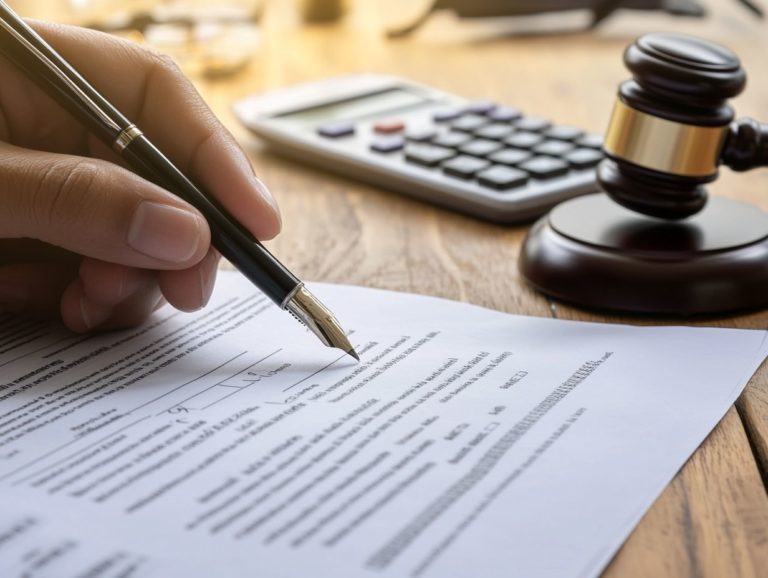The Cost of Defense Attorneys: What to Expect
Navigating the legal system can feel overwhelming, especially when you need a defense attorney. Understanding their role is just the first step; the financial implications can vary significantly based on several factors.
The costs associated with hiring a defense attorney can escalate rapidly due to factors like the attorney’s experience, the complexity of your case, and your geographical location.
This article will help you understand what to expect in terms of fees, payment structures, and strategies to reduce costs, empowering you to approach this journey with confidence and preparation.
Contents
- Key Takeaways:
- Understanding the Role of Defense Attorneys
- Factors That Affect the Cost of Defense Attorneys
- Typical Fees and Payment Structures
- Ways to Reduce the Cost of a Defense Attorney
- What to Expect During the Process
- Frequently Asked Questions
- What is the average cost of hiring a defense attorney?
- What is a flat fee and how does it differ from an hourly rate?
- What is a contingency fee?
- Are there any additional costs I should expect when hiring a defense attorney?
- Can I negotiate the cost of hiring a defense attorney?
- Is it worth hiring an expensive defense attorney?
Key Takeaways:

Defense attorneys have a crucial role in defending individuals in legal cases, providing legal advice and representation.
Factors such as experience, complexity of the case, and location can significantly impact the cost of a defense attorney, making it important to understand attorney fees for defense services.
Negotiating fees and considering public defender options can help reduce the cost of hiring a defense attorney.
Understanding the Role of Defense Attorneys
If you’re facing serious legal challenges, knowing how defense attorneys can help is crucial. Whether you are dealing with misdemeanor or felony charges, these professionals offer invaluable legal representation and help you understand criminal law.
They ensure you are fully informed about your rights and options at every stage of the criminal process.
From the moment of your initial consultation to the trial phase, a defense attorney s expertise can profoundly impact the outcome of your case. They play a vital role in negotiating fees, exploring payment structures, and preparing for key court appearances.
What Do Defense Attorneys Do?
Defense attorneys provide representation if you’re charged with a crime, ensuring your rights are safeguarded during court appearances and throughout the entire criminal process.
These skilled professionals undertake a range of critical tasks essential to the litigation process. They analyze the details of your case and use their expertise to pinpoint weaknesses in the prosecution’s arguments.
They prepare vital legal documents that form the foundation of a solid defense and often negotiate plea deals, which are agreements to plead guilty in exchange for a lesser sentence. Their extensive experience allows them to navigate trial complexities and make informed decisions that directly impact your legal representation, including how attorney fees influence your options.
Factors That Affect the Cost of Defense Attorneys
The cost of legal representation can fluctuate considerably based on various factors, such as the complexity of your case, the attorney’s level of experience, and the jurisdiction of the court proceedings.
This is particularly relevant for criminal defendants in Los Angeles who are confronting either misdemeanor or felony charges.
Experience and Reputation
An attorney’s experience and reputation are pivotal factors that directly impact their fees. In Los Angeles, experienced criminal defense attorneys often charge higher fees, reflecting their success in navigating cases.
This premium represents their skill in maneuvering through complex legal landscapes and the confidence they inspire in clients. As you explore your options for legal representation, it’s essential to weigh whether investing in a well-regarded attorney is worth it compared to the potential risks of choosing someone with less experience.
You must balance your budget with the need for a skilled attorney. Evaluating past client reviews and success rates is crucial in finding the right fit. This underscores the importance of making informed decisions as you navigate this critical process.
Complexity of the Case
The complexity of your case affects the costs of legal representation. Intricate cases require more time and resources from a criminal defense attorney, which influences their fees.
In criminal law, various factors come into play, such as the nature of the charges. Misdemeanors are less serious than felonies, which often have serious consequences.
Felony cases typically require expert witness testimony to support claims. This can increase costs significantly.
Setting up a clear payment plan with your lawyer is vital. It clarifies your financial responsibilities and sets expectations for your defense.
Understanding these factors can greatly impact your approach to representation and the strategies your lawyer uses.
Location and Court Fees

Location greatly affects the costs of legal representation. Court fees and attorney charges can vary widely by area.
In busy cities like Los Angeles, the demand for criminal defense attorneys drives up costs. High case volumes can lead to increased expenses for both clients and attorneys.
For instance, urban court fees often reflect higher operational costs and longer trial durations. This reality makes it essential for defendants to consider their options carefully when choosing a lawyer.
You may want to search for legal services with competitive rates. Alternatively, consider attorneys located closer to you to keep costs manageable.
Typical Fees and Payment Structures
It’s crucial to understand typical fees and payment structures as a defendant seeking legal representation. This knowledge empowers you to make informed choices.
Defense attorney fees can take various forms, including hourly rates, retainer fees, or flat fees. Familiarizing yourself with these options will help you make better choices about your legal representation.
Hourly Rates
Hourly rates are a common payment structure for defense attorneys. You’re billed based on the actual time spent on your case, which can significantly affect your overall legal fees.
This method gives you transparency about the hours worked, creating accountability between you and your attorney. However, it may lead to unpredictable expenses, especially if your case is more complex than expected.
Experienced attorneys often charge higher hourly rates due to their expertise. You need to weigh the value of their specialized knowledge against the financial strain of higher fees.
Understanding what influences attorney compensation, such as location and case complexity, is vital for making smart choices.
Flat Fees
Flat fees offer a clear, predetermined cost for specific legal services. This makes budgeting for attorney fees easier, especially for straightforward cases.
This structure is different from hourly agreements, where final costs can be uncertain. A flat fee provides predictability and protects you from unexpected expenses.
With flat fees, communication with your attorney becomes clearer. You can focus on your case without worrying about accumulating charges.
Retainer Fees
A retainer fee is your upfront payment to hire a defense attorney. It covers initial legal expenses and sets a clear payment plan for ongoing representation.
This arrangement ensures your attorney is available to meet your legal needs. It also outlines how fees will be billed as your case progresses.
Retainer fees are used in various legal scenarios, from criminal defense to family law. This fee acts as a buffer, ensuring you have continuous access to expert guidance.
Ways to Reduce the Cost of a Defense Attorney
When facing legal challenges, explore strategies to lower the costs of hiring a defense attorney.
Consider negotiating fees directly with your attorney. Look into public defender options if you qualify; they provide valuable legal help at little or no cost.
Familiarize yourself with different attorney payment agreements. This allows you to choose the most manageable option for your situation.
Negotiating Fees

Negotiating fees with a defense attorney can ease the burden of legal costs. Be open about your financial situation and payment expectations.
Open communication is key. It builds a trusting relationship and clarifies the attorney’s fee structure, which can vary based on your case’s complexity.
Ask about hourly rates, retainer fees, and any potential additional costs. Discussing flat-rate options can create a more flexible financial arrangement.
By understanding these elements, you can secure quality legal services while minimizing unexpected expenses.
Public Defender Options
If a private defense attorney is beyond your budget, consider public defender options. They offer essential legal representation at a reduced cost, especially for serious criminal charges.
Public defenders often have valuable experience in the criminal justice system. This expertise helps navigate the complexities of legal proceedings.
To qualify for their services, demonstrate financial need, which may involve submitting income and expense documentation.
While public defenders provide access to skilled attorneys without high costs, consider potential drawbacks. Heavy caseloads may limit the time they can dedicate to your case.
Understanding both the advantages and limitations helps you make informed decisions about your legal representation.
What to Expect During the Process
Knowing what to expect during your legal journey is essential. It prepares you for every step ahead.
It begins with an initial consultation, where you outline your case and set expectations. You ll engage in regular communication, ensuring you re never in the dark.
The journey concludes with final billing and payment arrangements, bringing clarity to the financial aspects of your legal experience.
Initial Consultation
The initial consultation is a pivotal moment in your journey to hire a defense attorney! Here, you have the opportunity to discuss your case, explore various legal representation options, and assess the attorney’s expertise.
As you prepare for this meeting, be sure to bring relevant documentation such as police reports or court summons to ensure a comprehensive discussion. Expect the attorney to ask focused questions that dive into the specifics of your case, including timelines and key events.
It’s also important for you to inquire about the lawyer’s experience with cases similar to yours, their strategic approach, and their fee structure.
This is your chance to find the perfect attorney for your case! It also lays the groundwork for a trusting relationship, which is crucial for establishing a successful legal partnership as you move forward.
Communication and Updates
Effective communication and regular updates between you and your defense team are crucial for successful legal representation. By staying informed and engaged throughout the process, you’re empowering yourself as a defendant.
Building a rapport with your attorney can significantly enhance your understanding of the case strategy and potential outcomes. It s vital to share any relevant information or concerns that may arise; even minor details can shift the direction of your case.
Establishing a schedule for updates ensures that you and your attorney remain aligned, creating a collaborative environment. You should feel comfortable asking questions and seeking clarity whenever necessary.
This open dialogue not only strengthens the attorney-client relationship but also leads to more effective legal representation.
Final Billing and Payment
Final billing and payment arrangements can vary greatly among defense attorneys, so it’s crucial to understand these costs as you navigate legal representation in your criminal case.
Be aware that, in addition to standard legal fees, unexpected expenses can arise during your case. These may include costs for expert witnesses, investigation fees, or court filing charges, which can add up quickly.
It’s important to review payment agreements carefully, as some attorneys may request upfront payments to secure their services or charge on an hourly basis, resulting in variations in overall attorney fees. Maintaining transparency in these discussions from the start can help you avoid surprises down the line and ensure a smoother legal process.
Frequently Asked Questions

What is the average cost of hiring a defense attorney?
The average cost of hiring a defense attorney can vary greatly depending on several factors. These include the complexity of the case, the experience and reputation of the attorney, and the location. On average, defense attorneys charge between $150 to $700 per hour. To better understand the fees and processes, consider reading about what to expect from a defense attorney consultation. However, they may also charge a flat fee or have a contingency fee arrangement.
What is a flat fee and how does it differ from an hourly rate?
A flat fee is a set amount that an attorney charges for their services, regardless of the time spent on the case. This type of fee structure is typically used for less complex cases. In contrast, an hourly rate means the attorney charges for the actual time and work they invest in the case, including research, meetings, and court appearances.
What is a contingency fee?
A contingency fee is an arrangement where the attorney only gets paid if they win the case. This type of fee is commonly used in civil cases, such as personal injury or medical malpractice. The attorney’s fee is a percentage of the final settlement or verdict, typically around 33%. If the case is not successful, the attorney does not receive any payment.
Are there any additional costs I should expect when hiring a defense attorney?
In addition to the attorney’s fee, there may be other costs associated with your case, such as court filing fees, expert witness fees, and administrative costs. These additional expenses can add up and should be discussed with the attorney before hiring them to ensure transparency and avoid any surprises.
Can I negotiate the cost of hiring a defense attorney?
Yes, you can negotiate the cost. Some attorneys may lower their fees or offer payment plans if you re facing financial difficulties.
Remember, the quality of your representation is crucial. Cheaper options might not give you the best service.
Is it worth hiring an expensive defense attorney?
Choosing a defense attorney is a personal decision. An experienced attorney can improve your chances of a favorable outcome, but there’s no guarantee.
Think carefully about the cost versus what s at stake your future could depend on it! Weigh your options before making a decision.






